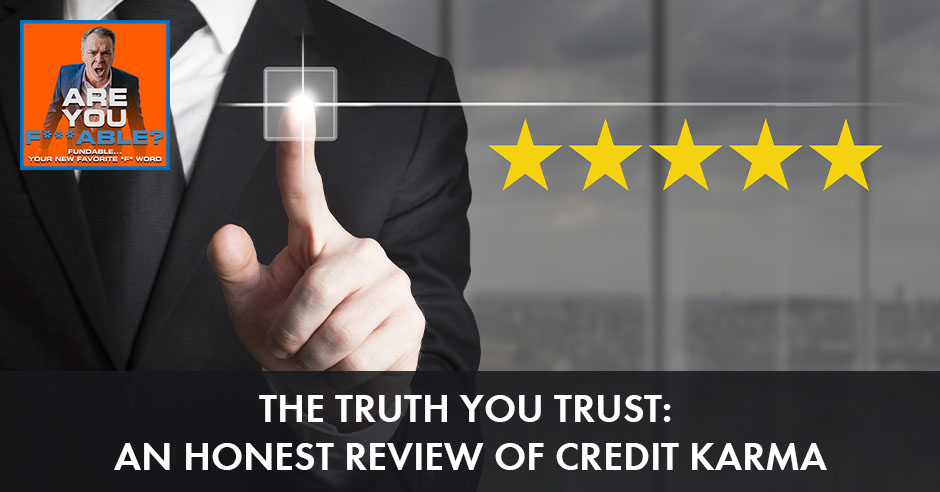
Today, it can be very easy to be lured by offers encouraging us to buy this and buy that. In this episode, Merrill Chandler teaches how not to fall prey to companies like Credit Karma which attract people to gain free credit scores and reports. Having used other methods for calculating scores and comparing it to FICO, Vantage scores, and the like, Merrill has concluded that Credit Karma is in it to make money through referral fees from those who sign up to linked business card companies. He encourages us to not trust this free score scheme for increasing our fundability™ and to be mindful about what information we give them regarding our finances.
—
Listen to the podcast here
The Truth You Trust: An Honest Review of Credit Karma
A Look At Credit Karma
I am so excited to share this with you. First of all, sometimes I just kill it. I’m going to be dropping you into a Facebook Live that we did about Credit Karma. I had spent weeks and it’s a lot of time reading their website so I could catch the important details. I don’t cover a ton of stuff, but I find you will not believe. It’s like liars, cheaters and thieves. That’s what we had for Facebook. When you read this, I hope you get as mad as I did. I don’t think I used profanity, but I was mad because Credit Karma has 80 million users and a withhold is as bad as a lie. I will be tearing Credit Karma a new one. I’m a little torqued. I got to tell you, I’ve got some stuff that I want to share with you that is not making me happy and I need to pass that along to you. First and foremost, what we’re going to look at is I’ve been promising liars, cheaters and thieves on Credit Karma.
What I want to do is I want to show you what Credit Karma is doing to mislead. I want to use a stronger word than mislead because it’s doing it intentionally and they’re obstructing the truth. They’re hiding the truth. I’m going to show you that. I’m not a happy camper. I would love for you to be a part of what we’re going to explore. First and foremost, let me orient you to what I’ve done. I have my Credit Karma credit scores for TransUnion and Equifax. For all of you who have been to the bootcamp, everybody who is working on optimizing their fundability™ for personal and your business, first things first. Remember how we talked about in the bootcamp, calculated using vantage score three. My range is pretty good, but they’re giving me a 756 on TransUnion and Equifax. No problem. They are calculated using the vantage three score. We know that’s a FAKE-O FICO score, vantage score. I’m going to put it in Credit Karma’s own words.
Do not believe what you are being sold from Credit Karma because they do not disclose critical details to your transactions fairly #GetFundable Share on XI’ve been transparent with you. My FICO scores are unweighted. I don’t know all the details since no lenders use vantage score three or very few lenders make lending decisions using vantage score three. I have not ever seen a weighted score that a lender would use. These are the straight-up, the equivalent of the marketing scores or the unweighted scores that we have talked about. For those of you who are new to this, remember FAKE-O scores are any score that’s not FICO score or a score used in a lender decision. Everything that they’re telling us is all about that FAKE-O score, vantage score three. I’m fifteen to twenty points higher in those same Equifax and TransUnion scores. Every twenty points is a tier. My true FICO score, even though these are the unweighted ones, I want to compare honestly, unweighted to unweighted. These unweighted scores, that’s fifteen to nineteen-point difference in these scores. That is monumental. I wanted to show you what the truth was if I was using these unweighted scores as a lender score.
An Audit On Credit Karma’s Website
As I’ve shared with you in the past, the whole point of Credit Karma is to make money. The way they make money is to give free credit scores and give you the impression that those credit scores are number one, meaningful and two, that you can impact these scores to help you in your lending. Let’s figure out. Let’s go through some of their stuff and let’s just audit this this website. They’ve got a little thing up, recommendations. What they’re trying to do with that little one, remember we all respond to our little indicators and our badges and notifications on our phones, etc. They’re saying, “I’ve got a message here. Let’s look at what that message is.” First of all, my recommendations. When I go to my recommendations, it’s telling me what is available to me as a borrower. They’re even presuming that these fit within my credit score. American Express, but what’s their number one recommendation?

Credit Karma: The whole point of Credit Karma is to make money by giving free credit scores and the impression that those scores are meaningful.
For those of us who have been through the training, who have been through the bootcamp or have done your due diligence in the podcasts and the blogs and you’ve been bingeing with us in figuring this out yourself, American Express is a tier-two 80% card. It can be a charge card, which means you have to pay it off at the end of the month. It’s not a true credit card. Citi Rewards Card, so there’s a Citibank. That’s a tier-one card, so no harm, no foul. This is a business card. The recommendations for me, I’m being sent to some business cards, what they call business cards. I’m being recommended business cards because I selected that I’m a business owner, but there’s a whole bunch of different indicators in that. I may go there anyway to blow the doors off of this.
There’s a Rapid Rewards Priority Card. That’s a co-branded card. Alaska Airlines, that’s a co-branded card, which means there’s a deduction in 20% as to who’s carrying the paper on this. If American Express is carrying the paper on this, that’s a tier-two 80% card or a 60% card because you lose 20% from who the paper-carrying author is. I know that’s a difficult language. If American Express, as a financial institution, it’s not a depository institution, so it’s a tier two. Because it’s marketing, it’s not depository, it’s 80%. If it’s carrying the paper for Alaska Airlines, if it’s co-branding with Alaska Airlines, you get an additional 20% deduction in the metrics that you learned in the bootcamp. American Express Magnet, Target Red Card, they’re putting a tier-four, 40% the lowest possible grade, and they’re recommending that to me.
There is no relationship between Credit Karma scores and anything that lenders are using to establish your fundability™ #GetFunable Share on XHere’s another. Southwest Rapid Rewards, Costco Anywhere Card by Citi. Citi is a tier-one depository bank. Costco is co-branded and you lose 80%. Capital One Venture Rewards Card, that’s tier-two, 80%. Capital One Saver One, all of these cards, they’re putting them back in line. We already looked at the Magnet card, we already looked at Costco. They’re literally providing the same information in the list over and over. HSBC, tier two depository bank, and so that’s a tier two. That very well may be a 100% card. This is what they’re recommending to me. I’m going to click overview. It’s going to get us back to the scores. I’m going to go back to my recommendations. This never goes away because they’re playing on your response that there’s something special, a message just for you. We go back to my recommendations. They have reordered and thrown in new cards. Journey was way at the bottom. Remember Student Rewards? Why would I get a Student Rewards Card? I’m not a student.
A Gold Delta Sky Miles, Capital One Quicksilver, Bank of America Travel Rewards, Hawaiian Airlines. The vast majorities are different or they’re the same ones in different order. This is so vital. Mastercard Titanium card. Sounds impressive. Except there is no depository bank, no marketing. We have no idea. I would put these in tier four automatically because they’re saying that Mastercard is carrying these. Mastercard, instead of just processing the payment, Mastercard is in the lending business. They, at best, are a tier three, if not a tier four card, because they’re not a depository institution and they’re marketing all of you. I saw a couple of these when I was preparing for this. Over and over there’s the Mastercard Titanium, back in black. Go back to the top, click on overview. Let’s just re-click and I’ve gotten two or three different groups. If we waited for five minutes, there would be an entirely new set of recommendations. Just remember all those cards.

Credit Karma: Credit Karma is mixing business and personal credit card recommendations.
The other thing I want to point out here is there’s credit. They’re telling us when we checked our credit. There’s no harm. My active five accounts, because they’re reading off of that vantage score, credit profile. They want me to link my cars and drivers because they want to sell me auto insurance through this website. They’re saying, “Discover your home buying power.” Vantage score three does not have a mortgage credit scoring that mortgage brokers use. What they do want to do is say, “We’re giving you all this information for free.” We’re giving you what they call trusted credit scores. They’re not. They’re FAKE-O scores but because you’re here, I might as well. I’m coming here to evaluate my credit worthiness. Eighty million users use this website and it’s complete BS, complete bunk. I’m here and I’m like, “How much home buying power do I have?” I click on home buying power and then it’s going to start to look credit, debt to income ratio, savings.
It’s like, “Credit score 556.” That’s the same credit score. It’s a weighted score. FICO uses a weighted score but they’re saying, “Your credit score is 756.” It’s not. No lender is going to use that 756 ever. I show up my monthly debt is, so I add monthly income. How does it work? It tells me I can unlock the next steps and I can find what my interest rates are on a 30-year fixed, fifteen or a variable rate interest. Let’s go back because I certainly don’t want to skew this. They’re going to sell me an audit defense. They’re selling me stuff here. Not only are they selling me which credit cards to use, because these were my recommendations. Let’s see if we’ve waited long enough, my recommendations, some of the same ones. What I need to tell you is because I notice, I usually have low balances and I pay on time.
Credit Karma is not interested in empowering you with the truth, but in giving you cards that pay them the most in referral fees #GetFundable Share on XYou may qualify for a card, look at their pitch that earns cash back on everyday purchases. They’re prioritizing for me what’s most important. Do I want miles? Do I have cashback? In your private profile, they let you choose those things. I’m going to go to a personal profile, my name, male, single. Student is no, but they put student things on there. I’m a business owner. “Do you usually carry a balance on your credit cards from month to month?” I say no. What do they do? They’re just categorizing but these little yes and no boxes, when I check them, it adds to the different cards that they want to put on my profile. Because I did business, they’re mixing business and personal credit card recommendations.
Here’s the thing, I already showed you whether or not they’re tier-two, tier-three or even subprime credit instruments. The thing is that these are usually in the order of the amount of money that they make off of the recommendation. Credit Karma is worth billions of dollars because 80 million people come over here and get a new card based on all of these criteria. “I get 60,000 miles. Hawaiian Airlines, awesome,” but notice Hawaiian Airlines World Elite Mastercard. We don’t know who’s carrying the paper. We don’t know if it’s a depository institution or if it’s Discover or American Express or Capital One that’s backstopping it and those are lower value institutions. They’re at least tier-two. Eighty million people are perusing this website and getting loan recommendations for being on this site. Thank heavens, you’ve been to the bootcamp or you’re getting ready to go to the bootcamp.

Credit Karma: Data is not what is getting your approved for credit but FICO scores that are evaluated.
You’ve watched the podcast. You’re part of the Get Fundable! community in one way or the other. Do not believe what you’re being sold. It’s insane. It is not fair that they do not disclose this. Let’s go to the disclosures. Do you want to go to the disclosures? Let’s go all the way to the bottom. All these, the best credit cards, popular offers, for good credit, bad credit, all these different styles, balance transfers are for debt shifters, travel cards. If you’re looking for travel hacking, none of these are telling you which should you use to build a fundable profile that’s going to score $20,000, $30,000, $50,000 business lines of credit. They’re not interested in empowering you with the truth. They’re interested in giving you cards that pay them the most in referral fees. GetFundable.com, we do not make a dime off of our recommendations. I don’t know if that’ll be true forever because we recommend some of those very cards that are tier one 100%. Right now, we do not collect a dime. We want to build a profile with you that is fundable. The fees you pay us are the fees that move us together through your coaching, through your bootcamps, etc.
I went through all of this. There are no disclaimers in here. You know the disclaimers I’m talking about. Both bootcampers and podcasters, you all know that disclaimer is where they’re supposed to say the truth about the type of credit score that they’re representing. I went over to credit scores and I pulled this up and what it says, “How to understand credit scores.” This is an interview of somebody. It’s about how little education there is out there. Your credit score is a three-digit number. Look at the nonspecific language. “Credit scores are three-digit numbers of how likely you will repay debt. Did you know you can have more than one credit score? How are credit scores created? All the main bureaus, Equifax, Experian, TransUnion, create your credit reports, which credit score models, like vantage score and FICO, use to come up with a score that typically ranges from 300 to 850.”
Those are unweighted scores. That is not a fair representation because all lending is done from different models than those unweighted 300 to 850 scores. Credit bureaus could also calculate scores for you based on their own proprietary models. All FAKE-O. They didn’t say FAKE-O, but it says, “Just in case, there might be a proprietary model.” No one is saying that everybody, but FICO, our FAKE-O scores in there are not used in your lending decisions. Your score will never factor in personal information like race, gender, etc. Typically based on payments on time and how many accounts you have in good standing. It says you could have different scores, “With so many ways to calculate, the credit score is not uncommon to have multiple scores at the same time.” Generic language, they’re hiding the truth. They’re withholding the truth. You could have a different score of a lender doesn’t report to all three bureaus. That’s true, but it’s not the reason why the difference between the scores you get from Credit Karma and real FICO scores, and reports update different times.
Some lenders only report to one or two bureaus or none at all. You can have also different scores depending on the lending situation. For example, an auto lender might use one scoring model while a mortgage lender uses another. That’s true. They’re not saying that about Credit Karma scores. These are possible reasons. They’re not saying, “We only have one score and lenders don’t use ours.” What’s the difference? Equifax, Experian, TransUnion collaborate to create a vantage score to offer more scoring consistency among the bureaus, which is a complete fabrication. There’s as much wide space between the bureaus as any of the FICO scores. The range depends on data consistency. It’s a complete bunk. Vantage score boasts that is 3.0 model can score millions more people than other models by incorporating up to 24 minutes of past credit activity, including utility and rent payments were available, which could open up more credit options for you. Remember, Chase is not going to give you a $50,000 business line of credit on your utility and rent payments.
Once again, they are hiding the truth. They’re saying in some ways are technically accurate. FICO, you have to opt-in to include utility and rent payments. We learned that from FICO itself, you have to have at least 80% of all business decisioning, all credit approvals, all funding approvals depend on your personal credit profile. They only get approved if your personal profile is optimized. Its fundability™ is optimized for business. Here it’s saying, “We’re just going to raise your score.” Remember we said scores are the third or fourth most important thing in a funding decision. They’re just throwing everything in, utility and rent payments. Everything that FICO has said, everything that we have studied, all of our work with our liaison with FICO, there is no significant business lending occurring from these little tiny additions of utility and rent payments. It’s not a thing. Vantage score has three scoring models and FICO has many more, but they all consider similar ways to calculate your scores. Payment history, how long you’ve had credit types of credit.
The Bottom Line
All of this is true, but they’re saying bottom line, your scores may vary, but they’re all based on the information in your credit reports. Except lenders don’t use vantage score or any other FAKE-O score. They’re saying it’s all from your data. Data is not what is getting you approved. The evaluation models, the lender, funding guidelines, all of the automatic underwriting criteria is basing on the data and/or the score but it’s only FICO scores that are being evaluated. I wanted to do this forever but check your credit reports so you can monitor what’s going on. Here’s their final push. Credit Karma shows your scores from Equifax, TransUnion, calculating the vantage score. It’s free and there’s no impact to your credit. On Credit Karma, you also get reports from Equifax or TransUnion for free. The data, no harm, no foul, but the score isn’t meaningful when it comes to your lender decisions.
Your scores or reports can be updated weekly, which helps you spot signs of possible identity theft. Credit Karma will always be 100% free. We never ask for your credit card information. Now that you know more about FAKE-O credit scores, about your credit scores, get your free scores and see where you stand. There is no relationship between Credit Karma scores and anything that lenders are using to establish your fundability™. This is just one example of how the credit bureaus, the merchants, websites use language to take advantage of your ignorance. All of you Funding Hackers, you know I am speaking the truth. All you podcast subscribers out there, you know that we are knocking it out of the park when it comes to evaluating the truthfulness. Truth in advertising, they have not said a lie. They withheld vast quantities of information. In any relationship I’ve been in, any relationship you’ve been in, isn’t it true that withholding is a lie? In all practical matters, a withhold is a lie. I will see you soon.




